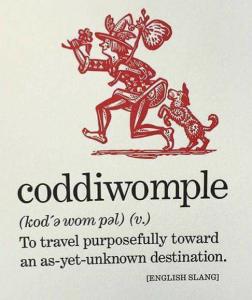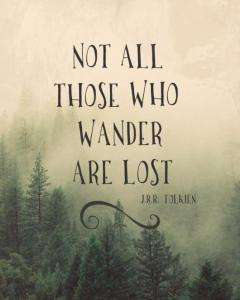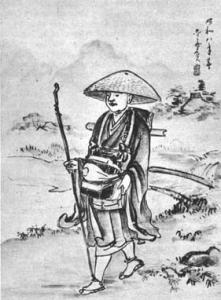I was delighted when I first saw the word “coddiwomple” and its definition “to travel purposefully toward an as-yet-unknown destination.” I liked it so much I decided to look it up. While it is listed in various online references to slang, it isn’t in any standard dictionary. Not even the biggest of them, the ones that do include slang terms. Before long I had to reconcile with the fact it is neologism, despite its antique sound, cooked up quite recently. No more than a few years old, I suspect.
But, it does attempt to capture in a word something real. Actually, something sufficiently important that maybe its good that it isn’t saddled, at least yet, with such a silly collection of letters. I’m not saying that “right” word needs to be something grand. But, it should be something that can capture the sense of J. R. R. Tolkien’s lovely “Not all those who wander are lost.”
I thought for a bit about the term “saunterer” as used by Henry David Thoreau. In his essay “Walking,” defines it.
I have met with but one or two persons in the course of my life who understood the art of Walking, that is, of taking walks – who had a genius, so to speak, for sauntering, which word is beautifully derived “from idle people who roved about the country, in the Middle Ages, and asked charity, under pretense of going a la Sainte Terre,” to the Holy Land, till the children exclaimed, “There goes a Sainte-Terrer,” a Saunterer, a Holy-Lander. They who never go to the Holy Land in their walks, as they pretend, are indeed mere idlers and vagabonds; but they who do go there are saunterers in the good sense, such as I mean. . . . [For] every walk is a sort of crusade, preached by some Peter the hermit in us, to go forth and reconquer this Holy Land from the hands of the Infidels.
But it has two problems. The first is that idly. That’s why I liked the coddiwomple definition, moving purposefully, even if the destination itself is not certain. The other problem is the unfortunate tying in with crusading. Even if as a dodge. Well, maybe that dodge thing is helpful. But, messy. And, all together, not quite it, either.
This made me pause for a moment and consider what it is that I’m hoping to find a word for. We get “travel” and “purposeful” and “unknown direction.” Also, “wander” and “not lost.”
For me it absolutely is about birth and death and more specifically that messiness in between those two mysteries . In fact maybe its not so much about birth or death, although they hang a frame around it. It is about that messiness in between. Itself a great mystery.
And, I realize I’m looking for words that describe my own experience of this great mess, this mystery that I am walking.
Walking. It has a sense of direction. No doubt. Whatever time really is, time is something we experience. If we’re lucky, we grow, and live, and experience, maybe even find love, learn things, unlearn things, become, unfold. And, in the goodness of time we begin to fall apart, first this, then that, small indignities and larger. Life. A journey.
And through it all the experience is captured within the geography of our bodies. And I guess the word I’m looking for describes the moment when we notice the whole of it.
It’s so easy, too easy to miss that in the urgency of each moment. However, that urgent moment is by itself disjointed, and to my experience ultimately dissatisfying. But, within presence some alchemy of the heart happens. We see the differences. Then we see the connections. Then we see how the differences and the connections are two faces of something.
So, for me that word that coddiwomple or saunterer or, really, as yet not captured, is meant to stand for that presence which is something more than merely paying attention. Or, maybe, it’s supposed to be about how we gain that fuller moment.
Not in a cookbook sense, although those can be helpful. The good ones, at least. Although sadly none appear to be completely good. Lots of red herrings on the trail in most of those spiritual, okay, in all those spiritual cookbooks. An aside.
Back to the quest for the right word, what in Zen we call the turning word. I had a conversation with a ministerial colleague from another spiritual tradition who told me she thought of us, we humans, as passing through. She referred to the old Christian term “pilgrim,” someone on a a journey to a holy place. I really liked that. Coddiwomple. Saunter. Pilgrim.
But, then she said, its about passing through as if we’re aliens, strangers in a strange land. And while I’ve certainly felt estranged on occasion, I also know pretty deep into my bones that there is no destination beyond what we find here. Within the bonds of birth and death. Completely within. So, in some sense we’re citizens here. Like it or not. This very place, and this very body, is where it has to be found.
So, the mixup of it all. The sense of travel, but not to any other place. Coddiwompling. Sauntering. Pilgrim. Lost. Found. Here.
Sometimes you just have to turn to the poets.
There is that lovely poem attributed to Rumi. I gather not actually by him. But, that doesn’t matter so much. It sings the deep truth.
Come, come, whoever you are. Wanderer, worshiper, lover of leaving. It doesn’t matter. Ours is not a caravan of despair. Come, even if you have broken your vows a hundred times. Come, yet again, come, come…
I think that captures the invitation for us all. This is the thing that calls us to turn to something like a religion or a spiritual path. It is the feeling that I feel whenever I am in the company of fellow travelers whatever their specific spiritual tradition. Coddiwomple. Saunterer. Pilgrim. Wanderer. Worshiper. And, now, lover of leaving. All those things.
And then T. S. Eliot in his Little Gidding, tells us a bit of the goal, of what we find when we throw ourselves full into that place, into that project.
We shall not cease from exploration
And the end of all our exploring
Will be to arrive where we started
And know the place for the first time.
And, so, of course, the wondrous Hakuin Ekaku sings to us about:
How sad that people ignore the near
And search for truth afar:
Like someone in the midst of water
Crying out in thirst,
Like a child of a wealthy home
Wandering among the poor.
He digs into it, singing into our hearts the confusion:
Lost on dark paths of ignorance,
We wander through the Six Worlds,
From dark path to dark path–
When shall we be freed from birth and death?
But, then finally, tells us the secret. Here is what we find within our coddiwompling, our sauntering, our pilgrimage, our wandering, our loving of leaving. It’s amazingly simple. And perhaps that’s part of the difficulty.
Here effect and cause are the same,
The Way is neither two nor three.
With form that is no-form,
Going and coming, we are never astray,
With thought that is no-thought,
Singing and dancing are the voice of the Law.
Boundless and free is the sky of Samádhi!
Bright the full moon of wisdom!
Truly, is anything missing now?
Nirvana is right here, before our eyes,
This very place is the Lotus Land,
This very body, the Buddha
The Japanese term for an ordained cleric is unsui. It translates as “clouds and water.” And perhaps that’s the deal. We’re not only made of dust to which we will return. I am those clouds. You are the water. We are the sailors. And we are the boat sailing.
And we are the sea.
Coddiwomple. Saunter. Pilgrim. Wanderer. Lover of leaving. Clouds and water.
Our journey is into it all…















